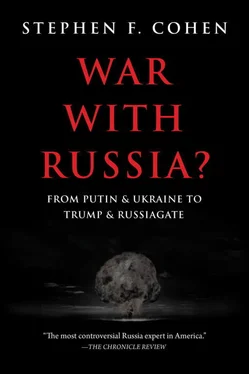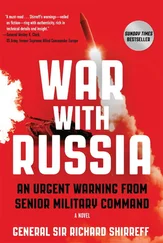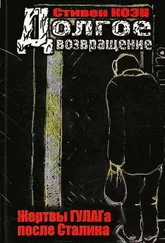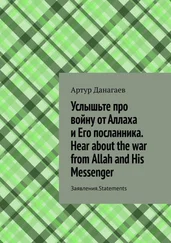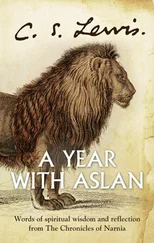* * *
All writers have help along the way, I perhaps more than many due to the wide range of my weekly subjects. Three people regularly helped me with information and, equally important, critical feedback: James Carden, Lev Golinkin, and Pietro Shakarian. My research assistant, Mariya Salier, provided expertise, both technical and substantive, well beyond that of the usual assistant. David Johnson’s daily email digest, Johnson’s Russia List , which includes non-mainstream articles and other materials, has been invaluable, as it is for anyone occupied with Russia. Also valuable is the website of the American Committee for East-West Accord ( eastwestaccord.com), of which I am a board member, edited by James Carden.
Farther away, my longtime friend Dmitri Muratov, chief editor of Russia’s most important independent newspaper, Novaya Gazeta , made my views accessible to readers in that country by translating and publishing a number of the articles in this book. (Reactions, not surprisingly, were mixed but nonetheless valuable.)
At The Nation , Ricky D’Ambrose, an innovative filmmaker in his other life, played an indispensable role every Wednesday by shepherding each weekly commentary from my computer to the website and in the process by making important editorial improvements.
And at the end, despite my missed deadlines, Tony Lyons, Oren Eades, and the team at Skyhorse Publishing turned my manuscript into this book with remarkable speed and skill.
I am very grateful to all of these people. And, of course, to John Batchelor, who gave me a national platform and made my evidently distinctive voice widely recognized from shops and restaurants to airports and a hospital operating room.
But the book would not have been possible in any way without the support of my wife, Katrina van den Heuvel, who is Editor and Publisher of The Nation . I owe her much more than gratitude. My commentaries put her in an unenviable position. That she did not “fully agree” or “only partially agreed” with many of them was customary in our thirty-year marriage. That some members of The Nation community were outraged by not a few of my commentaries, and made their “concerns” known privately and publicly, put a special burden on Katrina.
So did other public attacks that named her as my accomplice, even though Katrina has a long editorial history of printing a range of views on controversial subjects, including Russia. And even though she has her own very well-informed views on matters related to Russia frequently expressed not only in The Nation but also in her weekly Washington Post web column. In the age of widely professed feminism, it puzzles me why my critics so often associate Katrina with my views in virtually hyphenated ways.
Whatever the explanation, readers will understand why I owe my wife much more than gratitude. Whatever her own opinions, no matter the external pressures, Katrina posted every commentary I wrote.
All that said, I must emphasize, especially in these toxic times, an important caveat. Anything ill-informed or otherwise unwise in this book is entirely of my own doing.
SFC October 2018
Prologue
The Putin Specter—Who He Is Not
“Putin is an evil man, and he is intent on evil deeds.”
—Senator John McCain 1
“[Putin] was a KGB agent. By definition, he doesn’t have a soul.” “If this sounds familiar, it’s what Hitler did back in the 1930s.”
—2016 Democratic Presidential Nominee Hillary Clinton 2, 3
THE SPECTER OF AN EVIL-DOING VLADIMIR PUTIN HAS loomed over and undermined US thinking about Russia for at least a decade. Inescapably, it is therefore a theme that runs through this book. Henry Kissinger deserves credit for having warned, perhaps alone among prominent American political figures, against this badly distorted image of Russia’s leader since 2000: “The demonization of Vladimir Putin is not a policy. It is an alibi for not having one.” 4
But Kissinger was also wrong. Washington has made many policies strongly influenced by the demonizing of Putin—a personal vilification far exceeding any ever applied to Soviet Russia’s latter-day Communist leaders. Those policies spread from growing complaints in the early 2000s to US-Russian proxy wars in Georgia, Ukraine, Syria, and eventually even at home, in Russiagate allegations. Indeed, policy-makers adopted an earlier formulation by the late Senator John McCain as an integral part of a new and more dangerous Cold War: “Putin [is] an unreconstructed Russian imperialist and K.G.B. apparatchik…. His world is a brutish, cynical place…. We must prevent the darkness of Mr. Putin’s world from befalling more of humanity.” 5
Mainstream media outlets have played a major prosecutorial role in the demonization. Far from atypically, the Washington Post’s editorial page editor wrote, “Putin likes to make the bodies bounce…. The rule-by-fear is Soviet, but this time there is no ideology—only a noxious mixture of personal aggrandizement, xenophobia, homophobia and primitive anti-Americanism.” 6Esteemed publications and writers now routinely degrade themselves by competing to denigrate “the flabbily muscled form” of the “small gray ghoul named Vladimir Putin.” 7, 8There are hundreds of such examples, if not more, over many years. Vilifying Russia’s leader has become a canon in the orthodox US narrative of the new Cold War.
As with all institutions, the demonization of Putin has its own history. When he first appeared on the world scene as Boris Yeltsin’s anointed successor, in 1999–2000, Putin was welcomed by leading representatives of the US political-media establishment. The New York Times’ chief Moscow correspondent and other verifiers reported that Russia’s new leader had an “emotional commitment to building a strong democracy.” Two years later, President George W. Bush lauded his summit with Putin and “the beginning of a very constructive relationship.” 9
But the Putin-friendly narrative soon gave away to unrelenting Putin-bashing. In 2004, Times columnist Nicholas Kristof inadvertently explained why, at least partially. Kristof complained bitterly of having been “suckered by Mr. Putin. He is not a sober version of Boris Yeltsin.” By 2006, a Wall Street Journal editor, expressing the establishment’s revised opinion, declared it “time we start thinking of Vladimir Putin’s Russia as an enemy of the United States.” 10, 11The rest, as they say, is history.
Who has Putin really been during his many years in power? We may have to leave this large, complex question to future historians, when materials for full biographical study—memoirs, archive documents, and others—are available. Even so, it may surprise readers to know that Russia’s own historians, policy intellectuals, and journalists already argue publicly and differ considerably as to the “pluses and minuses” of Putin’s leadership. (My own evaluation is somewhere in the middle.)
In America and elsewhere in the West, however, only purported “minuses” reckon in the extreme vilifying, or anti-cult, of Putin. Many are substantially uninformed, based on highly selective or unverified sources, and motivated by political grievances, including those of several Yeltsin-era oligarchs and their agents in the West.
By identifying and examining, however briefly, the primary “minuses” that underpin the demonization of Putin, we can understand at least who he is not:
• Putin is not the man who, after coming to power in 2000, “de-democratized” a Russian democracy established by President Boris Yeltsin in the 1990s and restored a system akin to Soviet “totalitarianism.” Democratization began and developed in Soviet Russia under the last Soviet leader, Mikhail Gorbachev, in the years from 1987 to 1991.
Читать дальше
